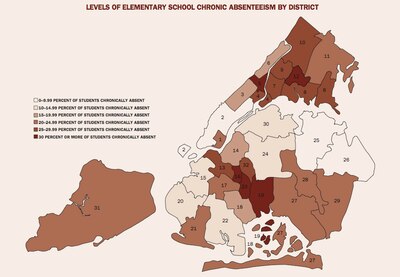
Inspired by a recent report that many elementary school students missed more than a month of school last year, the general welfare and education committees of the City Council just concluded a hearing about absenteeism in the city’s schools. One question that surely came up is how the Department of Education holds schools and students accountable for attendance.
The answer: not as much as it could.
In the centerpiece of the DOE’s accountability system, the school progress reports, a school’s average attendance accounts for 5 percent of its grade, the same proportion as teacher and parent surveys. The DOE chooses to base 85 percent of schools’ progress report grades on test scores because attendance on its own simply doesn’t ensure success, officials say.
“Most students do attend school regularly, but many of them do not get the outcomes we believe they should be getting,” DOE spokeswoman Maibe Gonzalez-Fuentes recently told me.
And what about accountability for individual students? Teachers can assign students failing grades for assignments they miss during an unauthorized absence. But DOE regulations don’t require students to attend school a certain amount of the time to be promoted.
In the grades where the chancellor has proclaimed an end to “social promotion,” attendance barely registers so long as students pass state tests in math and English. “Attendance is not a promotion requirement for grades 3, 5, 7, and now 8, although in grade 7 the principal has the right to retain students who are chronically absent,” according to Gonzalez-Fuentes.
And in other grades, attendance is just one of multiple criteria that schools consider when deciding whether to promote a student. Students in fourth and sixth grades for example, must attend school 90 percent of the time to be promoted if they either fail a state test or fall short in their academic work. (For details about promotion requirements, read Insideschools’ grade-by-grade guide.)
Gonzalez-Fuentes notes that all schools are required to create comprehensive attendance plans that include details about how they will identify and support chronically absent students.
